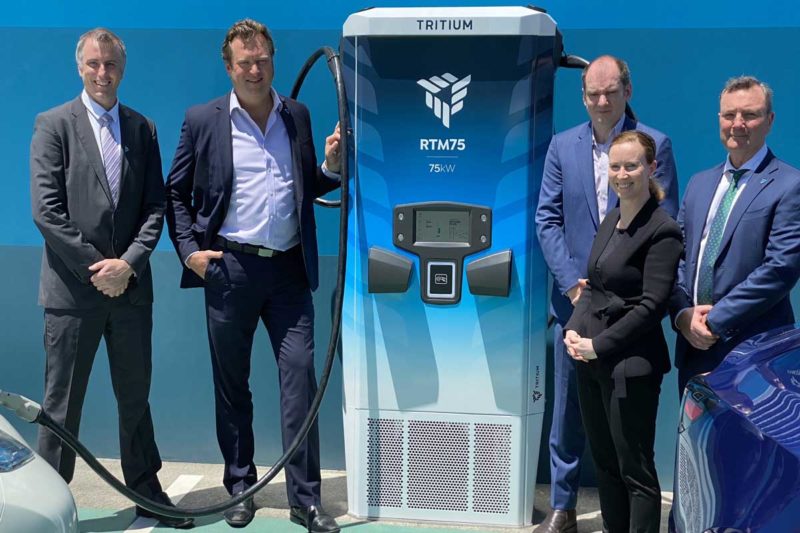Brisbane-based Tritium launched a modular electric vehicle (EV) charging platform on Tuesday that will enable sites to scale up charging rates as demand grows.
A world-first, according to the company, the “Modular Scalable Charging” (MSC) hardware platform consists of a base 75kW charger dubbed the RTM75, that can be increased in 25kW increments up to 350kW and beyond.
The modular platform does away with the need to rip out old platforms to install faster charging units, something that is bound to become a problem as electric vehicle uptake picks up pace.
“This has been something the industry and our customers have asked for over the years, and we are the first company in the world to deliver it,” said Jane Hunter, CEO of Tritium.
Hunter says that the MSC platform will allow the burgeoning EV charging sector to ensure it is ready to scale with EV adoption rather than become obsolete or have to invest in expensive re-fits.
“With our MSC platform, 50kW DC chargers can quickly be upgraded to 75kW, 100kW, and beyond, without a rip-and-replace required.”
It’s something the industry has been asking for some time, she says.
“No longer is a charger just a charger; instead, it’s the critical first step to meet the needs of both today’s and tomorrow’s electric vehicles.”
For smaller operators that do not have the requirements or budget for a 75kW rectifier to go with the RTM75 base unit, a 25kW or 50kW rectifier is also on offer.
The RM75 with 75kW rectifier can add 75km driving range for every 10 minutes of charging.
“The MSC hardware platform provides the next level of capital efficiency and scalability while still providing all the great attributes Tritium’s products have become known for: design, slimness, and low maintenance,” said Dr David Finn, founder and chief growth officer of Tritium in a statement.
“The electrification of transportation is at tipping point, so our customers want to know how they can easily extend their charging site capacity over the coming years.
“They want no regrets and capital efficient scaling of their charging sites. Tritium’s MSC hardware platform allows our customers to scale their charging sites for half the price and configure their charging sites for a desired reliability.”
Finn says that the RTM75 is just the beginning: next year, Tritium will apply its scalable technology to broader transport segments across the business and logistics industries.
“The MSC platform will allow Tritium to rapidly deploy new product and our aim is to provide at least one new product every quarter to address the needs of customers servicing the home/workplace, public, fleet depot, segments,” says Finn.
“The first product on the MSC hardware platform is the RTM75, with the PKM150 and PKM350 following in 2021.”
The RTM75 will allow two electric vehicles to charge on one unit at the same time, supports both the CCS and CHAdeMO plug standards and works with up to 920 volt electrical architectures.
The scalable unit will also work with Tritium’s world-first “Plug and Charge” (ISO 15118) technology, which does away with the need for credit cards and smartphone apps by allowing an electric vehicle to authenticate with a charger and “pay through the charging cable”.

Bridie Schmidt is associate editor for The Driven, sister site of Renew Economy. She has been writing about electric vehicles since 2018, and has a keen interest in the role that zero-emissions transport has to play in sustainability. She has participated in podcasts such as Download This Show with Marc Fennell and Shirtloads of Science with Karl Kruszelnicki and is co-organiser of the Northern Rivers Electric Vehicle Forum. Bridie also owns a Tesla Model Y and has it available for hire on evee.com.au.

